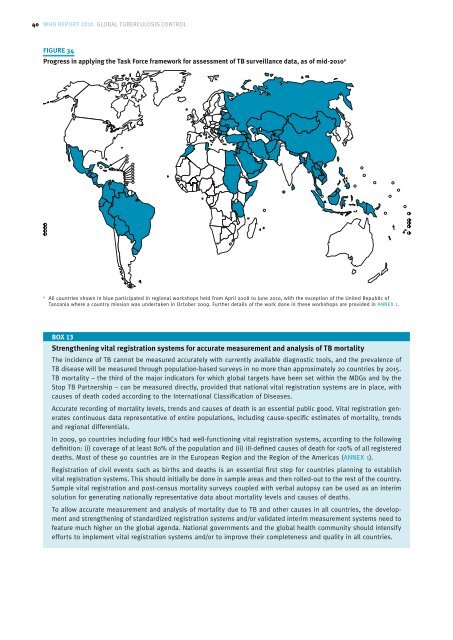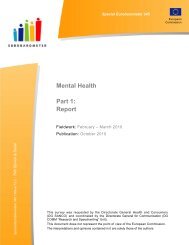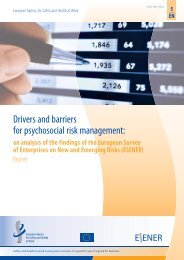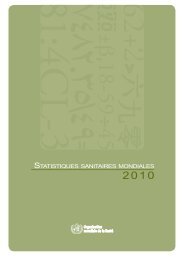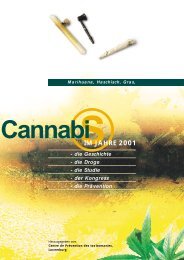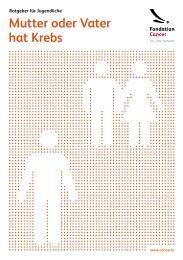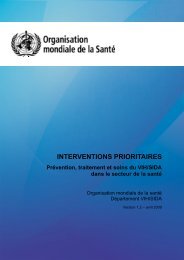Global Tuberculosis Control 2010 - Florida Department of Health
Global Tuberculosis Control 2010 - Florida Department of Health
Global Tuberculosis Control 2010 - Florida Department of Health
Create successful ePaper yourself
Turn your PDF publications into a flip-book with our unique Google optimized e-Paper software.
analysing surveillance and programmatic data, with<br />
analyses used to develop recommendations for how<br />
surveillance systems need to be strengthened and to<br />
produce updated estimates <strong>of</strong> disease burden. Regional<br />
workshops to apply the Task Force framework (<br />
) for systematic assessment <strong>of</strong> surveillance data were<br />
held in the Eastern Mediterranean, European, South-<br />
East Asia and Western Pacific regions and the Region<br />
<strong>of</strong> the Americas. Country missions in which the framework<br />
was applied were undertaken in the Philippines,<br />
the United Republic <strong>of</strong> Tanzania and Viet Nam. By July<br />
<strong>2010</strong>, these workshops and country missions had covered<br />
a total <strong>of</strong> 70 countries ( ). A workshop<br />
for 17 countries in the African Region is scheduled for<br />
December <strong>2010</strong>.<br />
An important conclusion from workshops and country<br />
missions was that there is an urgent need to strengthen<br />
vital registration systems, to allow better measurement<br />
<strong>of</strong> mortality ( ). There is also an urgent need to<br />
introduce electronic recording and reporting systems,<br />
without which it is difficult or impossible to adequately<br />
assess many aspects <strong>of</strong> data quality. Examples <strong>of</strong> aspects<br />
<strong>of</strong> data quality that are difficult or impossible to assess<br />
without case-based and electronic reporting systems<br />
include the extent to which misclassifications and duplications<br />
exist. In addition, the availability <strong>of</strong> electronic<br />
data, stored in well-managed relational databases (not<br />
Excel spreadsheets), greatly facilitates data analysis.<br />
More widespread adoption <strong>of</strong> updated recommendations<br />
on recording and reporting is also required (for example,<br />
to ensure availability <strong>of</strong> data disaggregated by HIV status<br />
and source <strong>of</strong> referral).<br />
An example <strong>of</strong> experience with implementing a casebased<br />
and electronic recording and reporting system<br />
(from China) in provided in.<br />
Besides improving estimates <strong>of</strong> the disease burden<br />
caused by TB, better data from surveys and surveillance<br />
combined with better analysis <strong>of</strong> these data should be <strong>of</strong><br />
great value in identifying where and why cases are not<br />
being detected. In turn, findings should help to identify<br />
which components <strong>of</strong> the Stop TB Strategy need to be<br />
introduced or scaled-up to improve TB control. Examples<br />
from Cambodia, Myanmar and Viet Nam are highlighted<br />
in the second edition <strong>of</strong> WHO’s guidelines on surveys <strong>of</strong><br />
the prevalence <strong>of</strong> TB disease. 1<br />
1<br />
The second edition <strong>of</strong> these guidelines (following publication <strong>of</strong><br />
the first edition in 2007) has been produced as a major collaborative<br />
effort among technical and financial partners and lead survey<br />
investigators from Asian and African countries. The guidelines<br />
were in the late stages <strong>of</strong> preparation at the time this report went<br />
to press, with publication expected before the end <strong>of</strong> <strong>2010</strong>.


